Kozlov and Biever in Nature:
 Scientists have created a neural network with the human-like ability to make generalizations about language1. The artificial intelligence (AI) system performs about as well as humans at folding newly learned words into an existing vocabulary and using them in fresh contexts, which is a key aspect of human cognition known as systematic generalization. The researchers gave the same task to the AI model that underlies the chatbot ChatGPT, and found that it performs much worse on such a test than either the new neural net or people, despite the chatbot’s uncanny ability to converse in a human-like manner.
Scientists have created a neural network with the human-like ability to make generalizations about language1. The artificial intelligence (AI) system performs about as well as humans at folding newly learned words into an existing vocabulary and using them in fresh contexts, which is a key aspect of human cognition known as systematic generalization. The researchers gave the same task to the AI model that underlies the chatbot ChatGPT, and found that it performs much worse on such a test than either the new neural net or people, despite the chatbot’s uncanny ability to converse in a human-like manner.
The work, published on 25 October in Nature, could lead to machines that interact with people more naturally than do even the best AI systems today. Although systems based on large language models, such as ChatGPT, are adept at conversation in many contexts, they display glaring gaps and inconsistencies in others. The neural network’s human-like performance suggests there has been a “breakthrough in the ability to train networks to be systematic”, says Paul Smolensky, a cognitive scientist who specializes in language at Johns Hopkins University in Baltimore, Maryland.
More here.

 W
W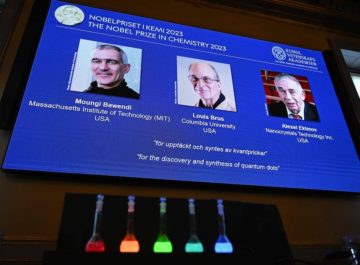 When you were working at Bell Labs in the 1980s and discovered quantum dots, it was something of an accident. You were studying solutions of semiconductor particles. And when you aimed lasers at these solutions, called colloids, you noticed that the colors they emitted were not constant.
When you were working at Bell Labs in the 1980s and discovered quantum dots, it was something of an accident. You were studying solutions of semiconductor particles. And when you aimed lasers at these solutions, called colloids, you noticed that the colors they emitted were not constant. Yascha Mounk: I admire you as a writer, but there’s one book of yours that I sort of stumbled across again recently which I found to be deeply insightful and also personally meaningful, and that is The Happiness Curve.
Yascha Mounk: I admire you as a writer, but there’s one book of yours that I sort of stumbled across again recently which I found to be deeply insightful and also personally meaningful, and that is The Happiness Curve.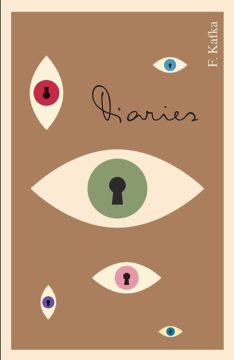 Franz Kafka was a champion of defeat, but he was also critically alive in the struggle to become himself. A prolific writer, he is thought to have burned or otherwise destroyed much of his own production. When he knew he was dying of tuberculosis, he asked his friend and literary executor, Max Brod, to burn the rest, excluding only the short stories that had already been published and had established his growing reputation. We can be grateful that Brod disobeyed his friend and saw to the publication of the unfinished novels, The Missing Person (as Amerika), The Trial, and The Castle. These books and assorted stories and fragments established Kafka posthumously as a singular genius, not only a great modernist, but a writer who transcended his time, dramatizing psychic battles between individuals and the savage powers of family, law, and the state. These are the very nets that Joyce’s Stephen Dedalus had wanted to fly past, and found he could not. Kafka’s fictions are not allegories, but dreams. Their absurdist logic is absolute and insane, sometimes hilarious, more often nightmarish. Yet they seem true to the world. Only a breathtakingly original artist could have devised them.
Franz Kafka was a champion of defeat, but he was also critically alive in the struggle to become himself. A prolific writer, he is thought to have burned or otherwise destroyed much of his own production. When he knew he was dying of tuberculosis, he asked his friend and literary executor, Max Brod, to burn the rest, excluding only the short stories that had already been published and had established his growing reputation. We can be grateful that Brod disobeyed his friend and saw to the publication of the unfinished novels, The Missing Person (as Amerika), The Trial, and The Castle. These books and assorted stories and fragments established Kafka posthumously as a singular genius, not only a great modernist, but a writer who transcended his time, dramatizing psychic battles between individuals and the savage powers of family, law, and the state. These are the very nets that Joyce’s Stephen Dedalus had wanted to fly past, and found he could not. Kafka’s fictions are not allegories, but dreams. Their absurdist logic is absolute and insane, sometimes hilarious, more often nightmarish. Yet they seem true to the world. Only a breathtakingly original artist could have devised them.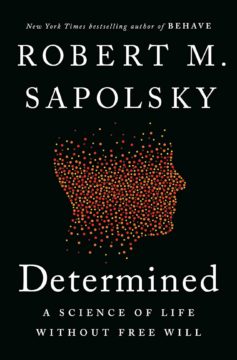 JULIEN CROCKETT: Most of the discoveries you reference in Determined are from the last 50 years, and half are from the last five, pointing towards a recent shift in biology and related fields. How has the answer to the fundamental question in biology—what is life?—changed during your career?
JULIEN CROCKETT: Most of the discoveries you reference in Determined are from the last 50 years, and half are from the last five, pointing towards a recent shift in biology and related fields. How has the answer to the fundamental question in biology—what is life?—changed during your career? Breast cancer is the most frequently diagnosed cancer and contributes to 15 percent of all cancer-related deaths in women worldwide. Though 20–30 percent of patients with early-stage breast cancers eventually develop
Breast cancer is the most frequently diagnosed cancer and contributes to 15 percent of all cancer-related deaths in women worldwide. Though 20–30 percent of patients with early-stage breast cancers eventually develop  T
T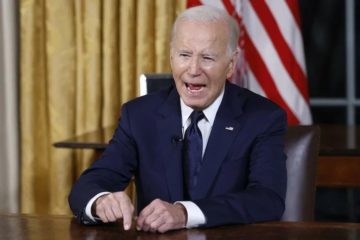 Whoever governs America, dysfunctionally or not, speculating about a post-American world, is a waste of time. And there a few key areas of global affairs in which American institutions today play a crucial organizational role. I have written often in this newsletter about the
Whoever governs America, dysfunctionally or not, speculating about a post-American world, is a waste of time. And there a few key areas of global affairs in which American institutions today play a crucial organizational role. I have written often in this newsletter about the 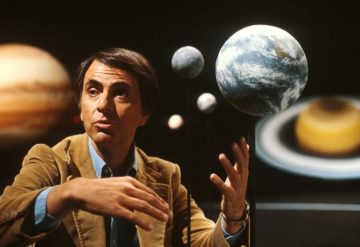 Early in 1993, a manuscript landed in the Nature offices announcing the results of an unusual — even audacious — experiment. The investigators, led by planetary scientist and broadcaster Carl Sagan, had searched for evidence of life on Earth that could be detected from space. The results, published 30 years ago this week, were “strongly suggestive” that the planet did indeed host life. “These observations constitute a control experiment for the search for extraterrestrial life by modern interplanetary spacecraft,” the team wrote.
Early in 1993, a manuscript landed in the Nature offices announcing the results of an unusual — even audacious — experiment. The investigators, led by planetary scientist and broadcaster Carl Sagan, had searched for evidence of life on Earth that could be detected from space. The results, published 30 years ago this week, were “strongly suggestive” that the planet did indeed host life. “These observations constitute a control experiment for the search for extraterrestrial life by modern interplanetary spacecraft,” the team wrote.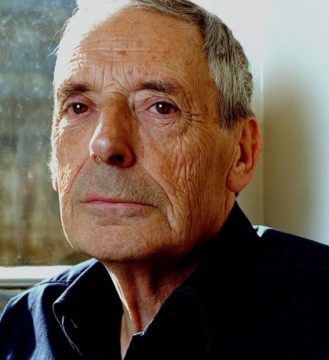 The acclaimed British philosopher
The acclaimed British philosopher 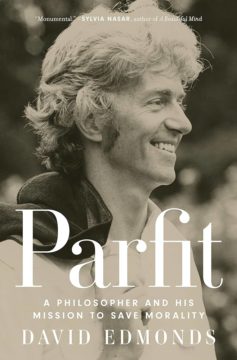 The subtitle of David Edmonds’s biography of the English philosopher Derek Parfit (1942-2017) is liable to raise more than a few eyebrows. Surely a mission to save morality is something only a God-like being could take on. And since God is dead, or rather has ceased to be believable, the prospect of rescuing morality must have vanished too. So is the subtitle to suggest that Parfit really was blessed with superhuman powers? Or are we to read it ironically, perhaps as a satirical comment on one philosopher’s exaggerated view of his own importance?
The subtitle of David Edmonds’s biography of the English philosopher Derek Parfit (1942-2017) is liable to raise more than a few eyebrows. Surely a mission to save morality is something only a God-like being could take on. And since God is dead, or rather has ceased to be believable, the prospect of rescuing morality must have vanished too. So is the subtitle to suggest that Parfit really was blessed with superhuman powers? Or are we to read it ironically, perhaps as a satirical comment on one philosopher’s exaggerated view of his own importance? Invisible Cities is built like a Boolean Truth Table. The mathematical table shows all possible combinations of inputs, and for each combination the output that the circuit will produce. It’s a logic operation. The categories we find in Invisible Cities – Hidden Cities, Cities and Desire, Cities and Memory, Thin Cities, Dead Cities, and so on – aren’t random. Once chosen, these “inputs” will reveal their “outputs”. Think of a Truth Table as including a column for each variable in the expression and a row for each possible combination of truth values (or cities in our case). Then add a column that shows the outcome of each set of values. That’s the dialogue between Marco Polo and Kublai Khan.
Invisible Cities is built like a Boolean Truth Table. The mathematical table shows all possible combinations of inputs, and for each combination the output that the circuit will produce. It’s a logic operation. The categories we find in Invisible Cities – Hidden Cities, Cities and Desire, Cities and Memory, Thin Cities, Dead Cities, and so on – aren’t random. Once chosen, these “inputs” will reveal their “outputs”. Think of a Truth Table as including a column for each variable in the expression and a row for each possible combination of truth values (or cities in our case). Then add a column that shows the outcome of each set of values. That’s the dialogue between Marco Polo and Kublai Khan. B
B